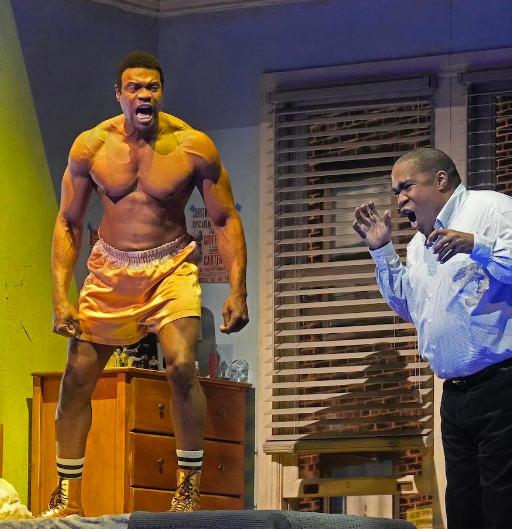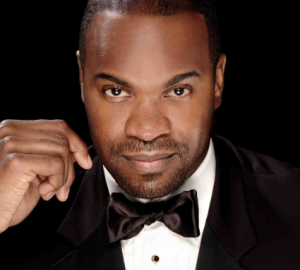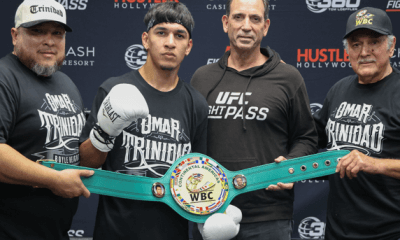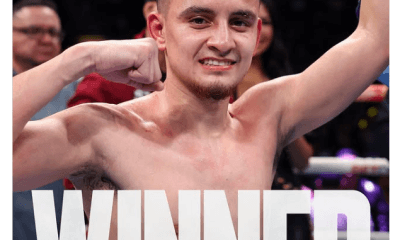Featured Articles
The Hauser Report: Notes and Nuggets from Sony Hall

When Eric Greene took his seat at a ringside table at Sony Hall on April 27, fans in attendance could have been forgiven for thinking that he was an athlete. Greene is 6-feet-5-inches tall and well-built with a physical aura about him. But he’s not an athlete; not in the conventional sense anyway. He’s an opera singer.
Greene is one of the stars in the Metropolitan Opera Company’s production of Champion – an opera based on the life of Emile Griffith that will run at Lincoln Center through May 13. He sings the role of Benny Paret, who taunted Griffith with homosexual slurs at the weigh-in prior to their 1962 fight and was beaten to death in the ring that night. He also plays the role of Paret’s son, Benny Jr. (The photo above, provided by The Met, shows the aging Griffith tormented by memories of Benny Paret Sr.)
Greene grew up in Baltimore and began singing in a Pentecostal church when he was four years old. Verdi is his favorite composer. One of his ambitions is to sing a lead role in a major production of each opera in the Wagner Ring Cycle. He listens to classical music and jazz for pleasure and has a liking for Ella Fitzgerald and Frank Sinatra.
As a child, Greene heard about boxing’s all-time greats from his grandfather and uncles. Later, he went to parties where people watched Mike Tyson, Lennox Lewis, and Manny Pacquiao on television. But he’d never been to a fight before.
“I worked out with purpose for the role of Benny Paret,” Greene says. “It underscored for me the rigors of being a boxer and the commitment it takes to do it well.” But he has no illusions about the difference between boxing and an operatic production. “Watching the fighters move in the ring is interesting to me,” Eric notes. “I worked on movement for Champion. But to see it for real up close like this is very different.”

Eric Greene
As the fights at Sony Hall progressed, Greene offered some thoughts on what he saw as parallels between boxing and opera:
* “Fighters need technique. They have to keep form. That same technique and form are what allow me to do what I do well.”
* “The focus and tenacity a fighter has to have round after round after round is a bit like the focus and tenacity you need to sing opera.”
* “Can you box? Can you sing? Can you do what it is that people pay money for you to do? So many people promote themselves on social media as being bigger and better than they are. But at the end of the day, either you deliver or you don’t.”
And what would Greene tell Benny Paret if he were able to talk with him today?
“I’d tell him that I admire his courage in getting in the ring, particularly that night when he didn’t feel right before the fight,” Greene answers. “There are times when I go onstage for a performance and don’t feel right. But that’s nothing compared to being a fighter.”
* * *
As for the fights . . .
This was promoter Larry Goldberg‘s fourth fight card at Sony Hall. He’d lost significant money on the first three but is coming closer to making the economics of promoting club fights in New York work.
The event was styled as a “Broadway Boxing” promotion under the banner of DiBella Entertainment. DiBella was using the card as a pilot for what Lou hopes will be an ongoing series with DAZN. But Goldberg was responsible for most of the nuts-and-bolts work.
The first bout saw David Lopez (2-0, 2 KOs) outclass Nelson Morales (3-5) over four tedious rounds. Some “opponents” come to win. Morales (who’d lost his most recent four fights) came to survive. He didn’t want to engage and lost every round.
Then Joshua Rivera (8-2, 3 KOs) faced off against Larry Fryers (11-6, 4 KOs, 3 KOs by). Fryers had been winless in his most recent six outings and Rivera had lost two of his last three. On the plus side, the fighters were evenly matched. Fryers prevailed when ring doctor Nitin Sethi appropriately stopped the bout after round five.
Then it was time for the most anticipated fight of the evening, a six-round grudge match between two fighters who are often on the B-side of bout sheets and genuinely dislike each other – Sydney Mccow (8-8, 3 KOs) vs. Christian Otero (4-3, 2 KOs). Adding fuel to the fire, Mccow’s wife had slapped Otero at the prefight weigh-in. That led Goldberg to hire extra security for the night.
Years ago, I interviewed Sylvester Stallone.
“I never went to a fight before I wrote Rocky,” Stallone told me. “The first fight I went to was Larry Holmes against Ken Norton at Caesars in Las Vegas. And to be honest, if I’d seen that fight before writing Rocky, the movie might have been a little different because one of the things that struck me about Holmes-Norton was the audience participation. At Holmes-Norton, I realized that the crowd is a character in itself.”
If you want to know whether or not a fight is entertaining, you can do one of two things. You can watch the fight or you can watch the crowd. If all eyes are focused on the ring and the crowd is cheering and “oohing” and “aahing,” it’s an entertaining fight. If people in the crowd are checking their cellphones and chatting casually with one another during rounds, most likely they’re bored.
Mccow-Otero was an entertaining fight between two evenly matched fighters, each of whom was fighting to win. Mccow was the aggressor and the stronger of the two. He was boxing and fighting. Otero was just boxing.
Matchmaking isn’t rocket science. People knew going in that Mccow-Otero would be a good fight. And it was. Mccow won a unanimous decision.
Miyo Yoshida (15-3) vs. Indeya Smith (6-6-2, 1 KO) was next – a bout between two women with one knockout between them in 32 fights. The room went quiet. People began checking their cellphones again. Yoshida won a majority decision.
That was followed by Tsendbaatar Erdenebat (5-0, 3 KOs) vs. Edy Valencia Mercado (20-9-6, 7 KOs). Erdenebat (a 2020 Mongolian Olympian) disappointed. As the bout progressed, he spent too much time moving and counterpunching en route to winning a lopsided 8-round decision rather than engaging with a one-dimensional opponent who has now won only once in his last six fights. There were some boos.
In the final bout of the evening, Brian Ceballo (13-1, 7 KOs) dominated but couldn’t stop Luis Alberto Veron (20-6-2, 9 KOs, 1 KO by), who has now won only 3 of his last 12 fights.
It was an unusual evening in that there were no knockdowns. More significantly, three of the six fights on the card were expected to be competitive. And they were. That’s a welcome relief from the A-side vs. B-side promotions that plague boxing today.
Thomas Hauser’s email address is thomashauserwriter@gmail.com. His most recent book – In the Inner Sanctum: Behind the Scenes at Big Fights – was published by the University of Arkansas Press. In 2004, the Boxing Writers Association of America honored Hauser with the Nat Fleischer Award for career excellence in boxing journalism. In 2019, Hauser was selected for boxing’s highest honor – induction into the International Boxing Hall of Fame.
To comment on this story in the Fight Forum CLICK HERE
-

 Featured Articles3 weeks ago
Featured Articles3 weeks agoThe Hauser Report: Zayas-Garcia, Pacquiao, Usyk, and the NYSAC
-

 Featured Articles2 weeks ago
Featured Articles2 weeks agoOscar Duarte and Regis Prograis Prevail on an Action-Packed Fight Card in Chicago
-

 Featured Articles1 week ago
Featured Articles1 week agoThe Hauser Report: Cinematic and Literary Notes
-

 Book Review4 days ago
Book Review4 days agoMark Kriegel’s New Book About Mike Tyson is a Must-Read
-

 Featured Articles4 weeks ago
Featured Articles4 weeks agoManny Pacquiao and Mario Barrios Fight to a Draw; Fundora stops Tim Tszyu
-

 Featured Articles4 weeks ago
Featured Articles4 weeks agoArne’s Almanac: Pacquiao-Barrios Redux
-

 Featured Articles3 weeks ago
Featured Articles3 weeks agoRemembering Dwight Muhammad Qawi (1953-2025) and his Triumphant Return to Prison
-

 Featured Articles4 weeks ago
Featured Articles4 weeks agoOleksandr Usyk Continues to Amaze; KOs Daniel Dubois in 5 One-Sided Rounds


















